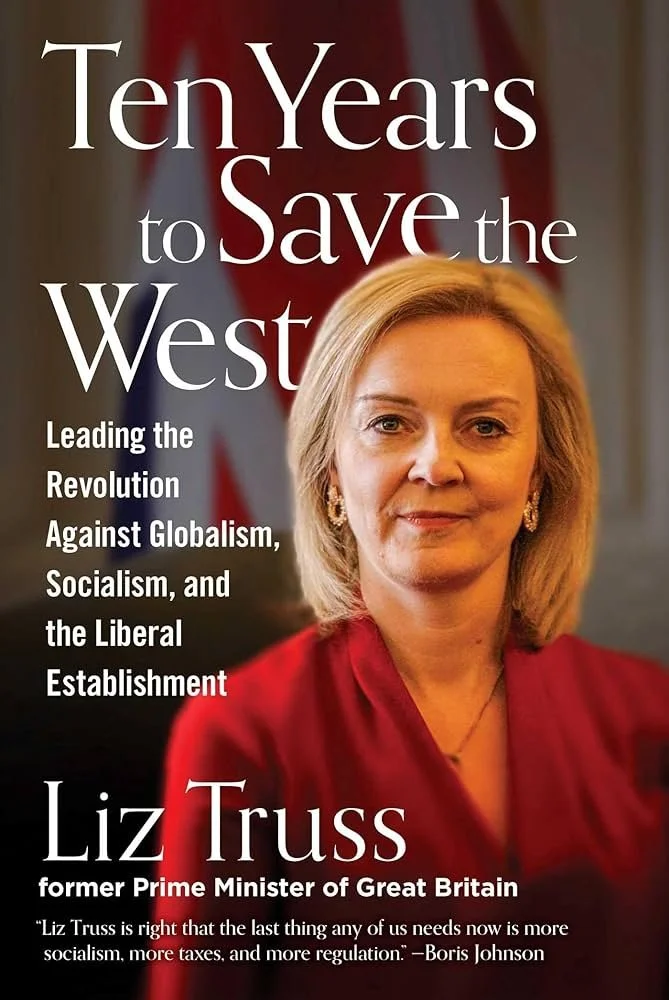Ten Years to Save the West by Liz Truss
/Ten Years to Save the West
By Liz Truss
Regnery 2024
There is a figure whose ignominy was so unprecedented that their surname has become universally italicised in common parlance. “Truss is doing the rounds again. Truss is in the Commons. Truss has released a new book.” Ten Years to Save the West is the obtuse and bad-tempered political memoir of Britain’s shortest-serving premier. Replete with a churlish subtitle - ‘lessons from the only conservative in the room’ - and a dust jacket precisely exhibiting all of Truss’ beady smarm, the publishing industry really has caught a live one this time.
The political memoir is a chameleonic subgenre. Too often do we encounter the macadamised mess of frail defeatists or the studiously mundane regurgitations of honest souls struck down in their prime. These former leaders either give it a fair crack and interpolate their life with sections of personal philosophy, or they dapple a partisan screed with occasional anecdotes. This book is the tempestuous exemplification of the latter. Lay any expectations of greater conversance at the door. This is a three hundred page tweedy clarion call for a conservative idealism that ducks and swerves the silly rigmarole of accountability and evidence-based criticism to leave even the fiercest Thatcherite repulsed at its harsh and befuddled prognoses.
Our cicerone brazenly eschews the fiddly hardship of chronology and instead bombards us with chapters each orbiting their own apparently demonic problem. With methodical and essayistic sincerity, she opines that “the progressive movement in education arose out of trends in postmodernist philosophy, pioneered by thinker Michel Foucault, which led to the notion that truth and morality are relative.” The current scholastic climate in the West is spiritedly criticised as an amalgam of “ideological fads” at odds with superior systems in China. Aside from this encouraging start, some tasty rumours about fleas in her Downing Street flat and a worthy segment on the Blairite creation of a lumbered judicial system, readers will be discombobulated at the book’s intemperate, self-serving, counter-factual nature.
Truss fulminates on how “the environmentalist worldview has become mainstream. It is now the dominant ideology in major corporations, media on both sides of the Atlantic and the legal establishment.” This faceless leftist mob will become a damnable factotum for all her other nonsensical finger-pointing at the Treasury, the Foreign Office and every poor sucker in between. Collective worriment about the dislocation of many millions as a result of permanently skewed weather systems is, according to Truss, the mania of “ecozealouts” whilst the 48% of the 2016 British voting public who expressed their wish to remain a part of the European Union during the foghorn festival of Brexit are sent packing as members of the “intellectual commentariat and left-leaning elites.” Even if Truss’ industrialised mendacity and sly obscurantism wasn’t sufficiently off-putting, her bouts of robotic piety and etiolated self-pity will be terminal. She tells us that she isn’t in fact the shambolic prime minister who tanked the UK economy with unfunded tax cuts for the top earners, but rather a slaughtered lamb who “was not sufficiently prepared for the institutional backlash and lacked enough support from [her] colleagues.”
Each and every upstanding reader of Ten Years to Save the West will be wondering why Truss ever pressed submit on this fetid trail of disconsolation. She might have saved this critic’s monthly visit to the cathartic axe-throwing alley, but what else explains this rouge-pampered Ivan Denisovich? Her leniency towards Boris Johnson and Donald Trump shows she’s possibly singling herself out for significance if another calamity of inchoate populism comes to stalk the land once more. Johnson’s heretofore unthinkable ushering in of cronyism, near fictional incompetence and subsequent defenestration is reimagined as an ousting, while Trump’s anti-democratic prattle is reworked as the intellectual bravery “resisted by public officials and the wider political establishment.” Her love affair with low taxation and abominable underestimation of anthropogenic climate change can surely be put down to a close affiliation with the notorious clique of libertarian lobby groups on Westminster’s Tufton Street, who count numerous oil companies as their surreptitious bankrollers.
This variegated miscegenation of lamentably dull prose, half-baked conjecture, unperturbed dishonesty and wayward focus makes for a changeable reading experience. The politically inclined will feel the cynical urge to snigger at her prolonged inexactitudes. Those interested in the domains of cognitive decline and unbridled sociopathy have themselves a wriggling specimen to embalm, and book critics tall and short, stocky and slim, liberal and conservative will happily dispense with this pimply rant of a recently expelled undergraduate. We cannot even, as a final saving grace, froth with glee at this malevolence through a safer fictional lens as we do with Humbert Humbert, Augustus Melmotte or Tom Ripley. Liz Truss is very real indeed and might, at this very minute, be haunting a government ministry near you.
Joe Spivey is a book critic currently residing in Kingston Upon Hull
